
Mannheim, officially the University City of Mannheim, is the second-largest city in the German state of Baden-Württemberg, after the state capital of Stuttgart, and Germany's 21st-largest city, with a 2021 population of 311,831 inhabitants. The city is the cultural and economic centre of the Rhine-Neckar Metropolitan Region, Germany's seventh-largest metropolitan region with nearly 2.4 million inhabitants and over 900,000 employees.

Karlsruhe is the third-largest city of the German state (Land) of Baden-Württemberg after its capital Stuttgart and Mannheim, and the 22nd-largest city in the nation, with 308,436 inhabitants. It is also a former capital of Baden, a historic region named after Hohenbaden Castle in the city of Baden-Baden. Located on the right bank of the Rhine near the French border, between the Mannheim/Ludwigshafen conurbation to the north and Strasbourg/Kehl to the south, Karlsruhe is Germany's legal center, being home to the Federal Constitutional Court (Bundesverfassungsgericht), the Federal Court of Justice (Bundesgerichtshof) and the Public Prosecutor General of the Federal Court of Justice.

Dortmund is the third-largest city in North Rhine-Westphalia, after Cologne and Düsseldorf, and the eighth-largest city in Germany. With a population of 609,000 inhabitants, it is the largest city of the Ruhr as well as the largest city of Westphalia. It lies on the Emscher and Ruhr rivers in the Rhine-Ruhr Metropolitan Region and is considered the administrative, commercial, and cultural centre of the eastern Ruhr. Dortmund is the second-largest city in the Low German dialect area, after Hamburg.

Münster is an independent city in North Rhine-Westphalia, Germany. It is in the northern part of the state and is considered to be the cultural centre of the Westphalia region. It is also a state district capital. Münster was the location of the Anabaptist rebellion during the Protestant Reformation and the site of the signing of the Treaty of Westphalia ending the Thirty Years' War in 1648. Today, it is known as the bicycle capital of Germany.

Arnsberg is a town in the Hochsauerland county, in the German state of North Rhine-Westphalia. It is the location of the Regierungsbezirk Arnsberg administration and one of the three local administration offices of the Hochsauerlandkreis district.
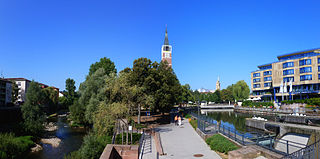
Pforzheim is a city of over 125,000 inhabitants in the federal state of Baden-Württemberg, in the southwest of Germany.

Neumünster is a city in the middle of Schleswig-Holstein, Germany. With more than 79,000 registered inhabitants, it is the fourth-largest municipality in Schleswig-Holstein. The Holstenhallen and the Stadthalle make the city an important trade fair location.
The Goethe Prize of the City of Frankfurt is an award for achievement "worthy of honour in memory of Johann Wolfgang von Goethe" made by the city of Frankfurt am Main, Germany. It was usually an annual award until 1955, and thereafter has been triennial. Following a decision of municipal authorities in 1952, the "Award of the Goethe Prize" only takes place every three years. Many recipients are authors, but persons working in several other creative and scientific fields have been honoured. The prize money is €50,000.

Moers is a German city on the western bank of the Rhine, close to Duisburg. Moers belongs to the district of Wesel.
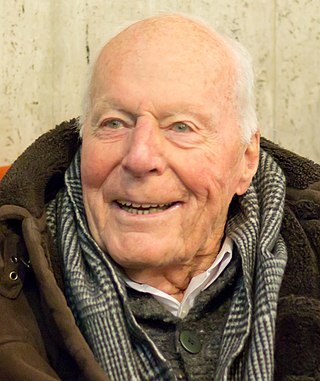
Gottfried Böhm was a German architect and sculptor. His reputation is based on creating highly sculptural buildings made of concrete, steel, and glass. Böhm's first independent building was the Cologne chapel "Madonna in the Rubble". The chapel was completed in 1949 where a medieval church once stood before it was destroyed during World War II. Böhm's most influential and recognized building is the Maria, Königin des Friedens pilgrimage church in Neviges.
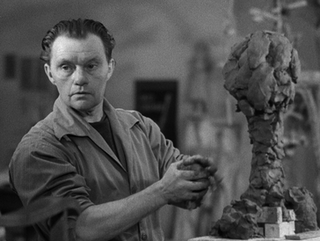
Fritz Cremer was a German sculptor. Cremer was considered a key figure in the art and cultural politics of East Germany. He is most notable for being the creator of the "Revolt of the Prisoners" memorial sculpture at the former concentration camp of Buchenwald.

During the latter stages of World War II, Pforzheim, a town in southwestern Germany, was bombed several times. The largest raid, one of the most devastating area bombardments of the war, was carried out by the Royal Air Force (RAF) on the evening of February 23, 1945. Some 17,600 people, or 31.4% of the town's population, were killed. About 83% of the town's buildings were destroyed, two-thirds of the complete area of Pforzheim and between 80% and 100% of the inner city.
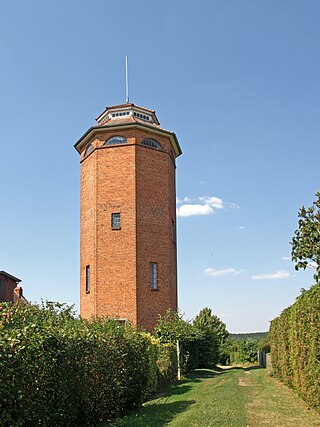
Laage is a town in Rostock (district) in Mecklenburg-Vorpommern (Germany). It is situated on the river Recknitz, 23 kilometers southeast of Rostock.
Fritz Werner was a German choral conductor, church music director, conductor, organist and composer. He founded the Heinrich-Schütz-Chor Heilbronn in 1947 and conducted it until 1973.

Zürich is the largest city in Switzerland and the capital of the canton of Zürich. It is located in north-central Switzerland, at the northwestern tip of Lake Zürich. As of January 2023 the municipality had 443,037 inhabitants, the urban area 1.315 million (2009), and the Zürich metropolitan area 1.83 million (2011). Zürich is a hub for railways, roads, and air traffic. Both Zurich Airport and Zürich's main railway station are the largest and busiest in the country.
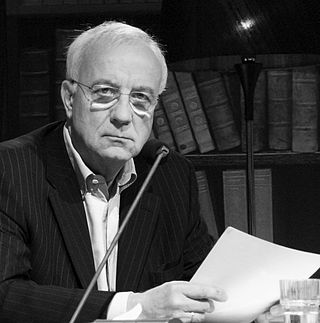
Fritz Ferdinand Pleitgen was a German television journalist and author. He was correspondent in Moscow, East Berlin and Washington. Pleitgen was a supporter of Willy Brandt's Ostpolitik. In 1988, Pleitgen became editor-in-chief of television of Germany's then-largest public broadcaster, Westdeutscher Rundfunk (WDR), and was director of WDR from 1995 to 2007. He is regarded as one of the most influential German journalists and media makers. In 2010, he was the manager of Ruhr.2010, a project of European Capital of Culture.

Fritz Erler was a German politician representing the Social Democratic Party (SPD). From 1953 to 1957, he was Deputy Chairman of the Defense Committee of the Bundestag, the West German parliament. In this role, Erler played an important role in drafting the legislation that ensured democratic control of the Bundeswehr, West Germany's new armed forces.

Peter Kurz is a German politician of the Social Democratic Party of Germany (SPD). He was the Lord mayor of Mannheim, the second-largest city in the German state of Baden-Württemberg from 4 August 2007 to 3 August 2023.

Gisela Erler is a German researcher, feminist, entrepreneur and politician, who is a member of the Green Party. She is credited with playing a role in the development of family benefits in Germany, such as parental allowance and the right to a day-care place for children. From 2011 to 2021 she was a member of the state government of Baden-Württemberg, with responsibility for "Civil Society and Citizen Participation".

Nargess Eskandari-Grünberg is a German politician for Alliance 90/The Greens. Since 2021 she has been Bürgermeisterin of Frankfurt am Main; following the recall of previous Oberbürgermeister Peter Feldmann, she has acted as Mayor of Frankfurt on a caretaker basis from 12 November 2022 until the mayoral election in March 2023.


















